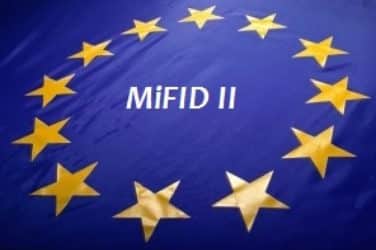When preparing for MiFID II’s roll out in January 2018, some US asset managers may have an easier time digesting the new mandates if they used their preparation for the EU’s Alternative Investment Fund Managers Directive as an appetizer, according to industry experts.
“If a firm has already gone through this preparation process of evaluating AIFMD, I think they will be well positioned to cope with evaluating MiFID II,” said Nicola Le Brocq, a regulation and compliance market analyst at Confluence.
AIFMD affects those US asset managers that have unitized their products like in the form of mutual funds, Le Brocq noted.

Nicola Le Brocq,
Confluence
“They likely have gone through this process deciding what is the scope of AIFMD and whether they were affected,” she added. “US asset managers who don’t have unitized products and offer pure discretionary or segregated accounts might struggle a bit more.”
Whether an US asset manager prepared for AIFMD or not, all US asset managers should consider how MiFID II’s requirements might affect their direct trading, contractual services, and marketing in the EU, Le Brocq proposed.
From a priority regarding the scale and impact, trading should be the lead consideration if the manager trades with Europe in some way, she said. “This is because trading is the crux of business operations. MiFID II brings about a lot of changes at trade.”
Post-implementation, US asset managers potentially could see higher costs and less liquidity when trading European securities, especially in the fixed-income and OTC derivatives markets, she hypothesised in a recent blog post on the topic.
US asset managers also should consider their delegation and outsourcing arrangements they have with European managers. Under MiFID II, the US managers could find themselves required to assist with their European managers’ transparency and reporting obligations.
Reviewing MiFID II’s impact on a firm’s marketing might be considered less of a priority than other areas Le Brocq suggested.”I only say that because there is a lot of uncertainty because the marketing provision and the marketing aspects look at ‘third country,’ which is a relatively new concept.”
In the meantime, US asset managers shouldn’t wait to investigate how MiFID II will affect them.
“There’s a hard deadline of January 2018,” she said. “In one respect, all of these areas are important and should be a ranked as a priority if MiFID II would have an impact on a firm’s operations or business relationships.”
More on MiFID II:
- Industry Prepares for MiFID II Time Sync
- MiFID II: Brexit, Pain Points and Other Hurdles (by Ivy Schmerken, FlexTrade)
- Buy Side Faces Heavy Lift on Reporting Mandate




